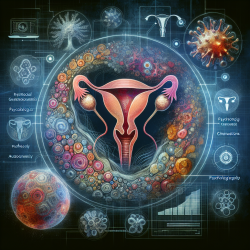Introduction
The Interstitial Cystitis: Elucidation of Psychophysiologic and Autonomic Characteristics (ICEPAC) Study offers a groundbreaking approach to understanding Interstitial Cystitis/Bladder Pain Syndrome (IC/BPS). This condition, affecting approximately 2.5% of the population, is characterized by severe bladder pain and a host of comorbid disorders. The ICEPAC study, as detailed in the research article, aims to explore the autonomic and psychophysiologic characteristics of IC/BPS, providing a comprehensive methodology that could significantly impact treatment approaches.
Methodology and Approach
The ICEPAC study adopts an interdisciplinary approach, comparing neurologic, urologic, gynecologic, autonomic, gastrointestinal, and psychological features among women with IC/BPS, their female relatives, women with myofascial pelvic pain (MPP), and healthy controls. This broad comparison aims to elucidate the role of central and peripheral nervous system processing in IC/BPS.
The study plans to recruit 228 women, divided into groups of IC/BPS, MPP, family members, and healthy controls. Participants undergo extensive screening, including neurologic examinations, autonomic testing, and psychological assessments. The methodology emphasizes the importance of a comprehensive, interdisciplinary approach, which has been shown to be feasible and effective, despite initial challenges.
Key Findings and Implications
While the study is ongoing, early data suggests significant overlap between IC/BPS and other pain syndromes, indicating a potential nervous system disorder. This overlap includes symptoms such as headache, abdominal pain, and increased sympathetic activity, which may lead to new treatment strategies focusing on autonomic nervous system dysfunction.
For practitioners, these findings highlight the importance of considering systemic nervous system involvement in IC/BPS and related conditions. Implementing a holistic approach that includes psychological and autonomic assessments could improve patient outcomes.
Encouragement for Further Research
The ICEPAC study serves as a template for future research into complex pain syndromes. Its interdisciplinary nature and comprehensive data collection offer valuable insights that can be applied to other conditions, such as gastrointestinal and visceral pain disorders. Practitioners are encouraged to explore similar methodologies in their research to uncover new treatment avenues.
Conclusion
The ICEPAC Study represents a significant step forward in understanding the complexities of IC/BPS. By integrating diverse perspectives and methodologies, the study not only addresses the autonomic and psychophysiologic characteristics of the condition but also sets a precedent for future interdisciplinary research. Practitioners and researchers alike can draw valuable lessons from the ICEPAC approach, potentially leading to more effective treatments and improved patient care.
To read the original research paper, please follow this link: Interstitial Cystitis – Elucidation of Psychophysiologic and Autonomic Characteristics (the ICEPAC Study): design and methods.










